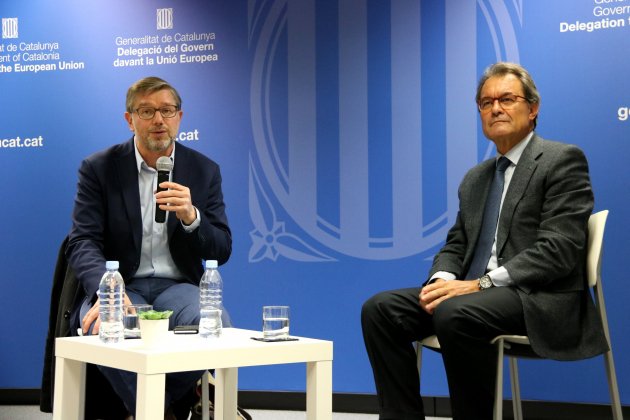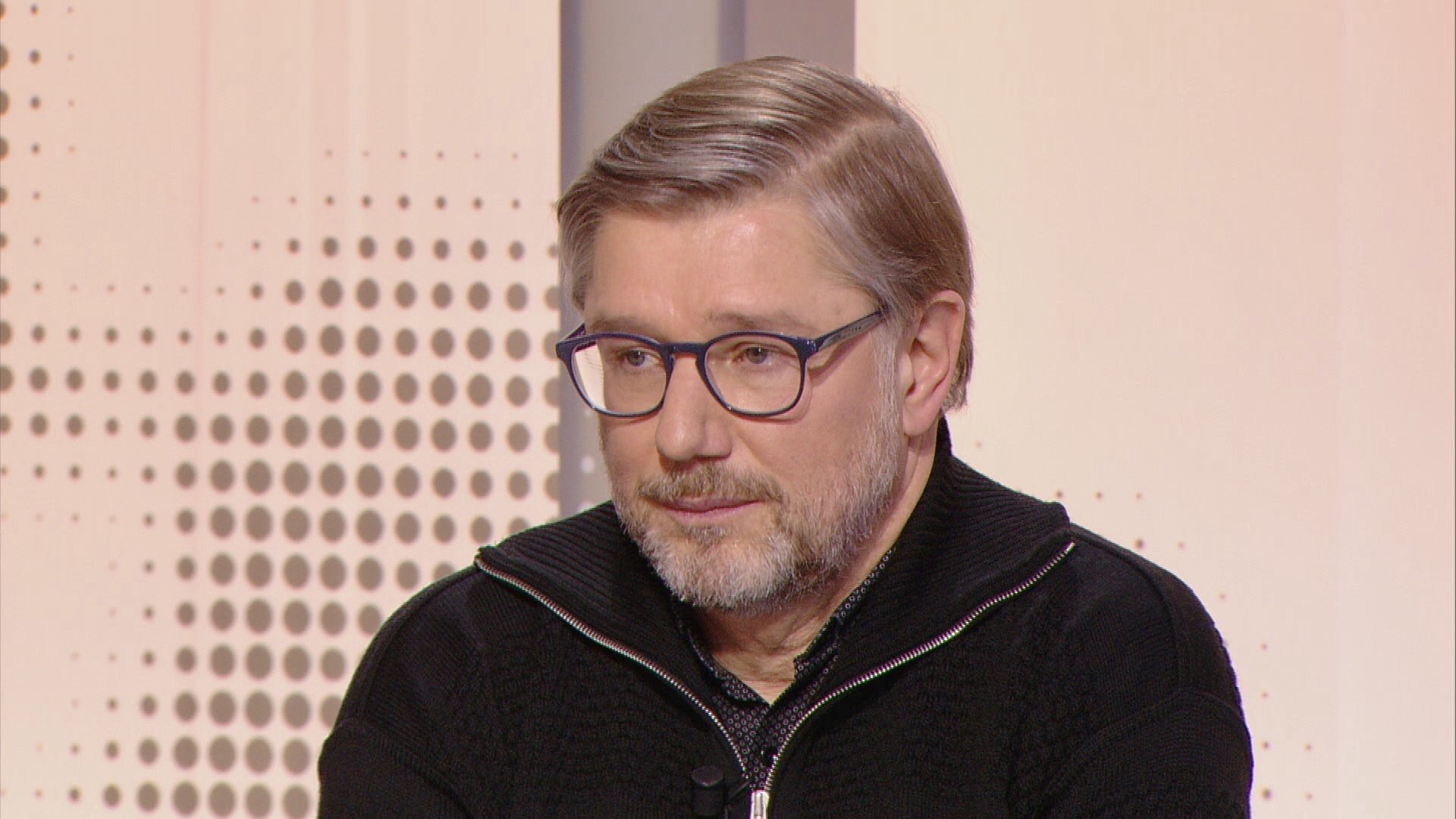Jean Quatremer (Nancy, France, 1967) is one of the most influential journalists in Brussels. He arrived in the Belgian capital twenty-five years ago, and from that city has chronicled the process of European construction —and all its crises— in the pages of the French newspaper Libération. He is directly opposed to independence movements (including the Catalan one), but admits that, if he was Catalan, he would vote yes. He would do so “to take the side of those who are oppressed”: the voters who receive baton blows and the political and social leaders who are imprisoned for their ideas.
Quatremer recounts that a short time ago he discovered that Mariano Rajoy was following him on Twitter. He doesn't know if it is to spy on what he says. To take just one example, last autumn he received a call from the Spanish foreign ministry asking him not to moderate a debate with the former Catalan president Artur Mas. He didn't give in to the pressure.

ACN
You have spoken up about a a drift of democracy in Spain...
I did so because the political power in Madrid is trying to solve a political crisis by judicial means, interpreting the law in the most repressive way possible. The crime of rebellion, without violence, is not applicable. The only violence was from the [Spanish] state, not the independence movement.
In the same way, to put the 'Jordis' and a part of the [Catalan] government in prison is an attack against freedom of speech and political freedom. In democracy you don't imprison those you don't agree with, even if their idea consisted of proclaiming the independence of Catalonia (which did not devolve into violence).
And the veto of Puigdemont's investiture as president?
It's another element which shows this severe drift. At no moment has he been put on trial nor deprived of his civil rights. Like any deputy in any normal democracy, he enjoys parliamentary immunity. These are just some examples, which could multiply if you add in the legal persecution of simple citizens. Or the Spanish police who force French citizens to remove the Catalan flag from their car's number plate (link in Catalan). I'm surprised by the lack of reaction from other European countries towards what is happening today in Spain.
Rajoy himself got in touch with Constitutional Court judges before they met. Is there also a problem of separation of powers?
It's not me, but a body of the Council of Europe in Strasbourg, a group of lawyers, who have spoken out about the "problematic independence" of the Spanish judiciary. It's extremely politicised, submitted to political power. There are many political nominations. When you look at the ranking of European legal systems, you realise that Spanish is in almost last place for independence of justice. Today the Spanish system is showing its limits, inherited from the dictatorship.
I have no sympathy for the independence proposition, but the political problem in Catalonia won't be solved by repression
Why do you say so?
Everyone knows that the '78 Constitution was negotiated and accepted under fear of a military coup. Its authors were scared to their stomachs that the transition to democracy would be interrupted, as it could have been in '81 with Tejero [the civil guard lieutenant colonel who attempted a coup on 23rd February that year]. Contrary to the gilded legend of a successful democratic transition, Spain isn't a full democracy, but a problematic democracy.
Is this drift comparable to that of other European countries?
For me, what's happening today in Spain with Catalonia is as serious as what's happening in Poland and Hungary. It's on the same level. That said, I'd like to clarify something important...
What?
I have no sympathy for the independence proposition. For me, regionalism is a mistake, against the European idea. But in Catalonia there's a political problem, which won't be solved by repression and the justice system. Even if I'm against independence, the repressive response of the central Madrid power does nothing more than inflame the problem. The problem was created by Madrid annulling the new Catalan Statute of Autonomy in 2010, and now it's making it worse by repressing the independence supporters and not taking into account the result of an election which Madrid themselves called.
Many of those who, from outside, denounce all these things that you denounce, are accused of pro-independence propaganda... I think of Julian Assange, for example.
Because the aim of the Spanish state's defenders is to simplify the debate as much as possible. It's very good for them for it to be binary, black and white, when it's much more complex. But you can't pretend that an aspiration for independence doesn't exist. You can't pretend that this aspiration wasn't created by a Constitutional Court which did politics when it was asked to do law. You can't avoid seeing that Rajoy has refused all dialogue. Simplifying the debate is the best way to end up in a confrontation.
But it's not the first time that the PP government has showed its true nature. It did so with the abortion law, with the famous ley mordaza ["gag law", a 2015 modification to public security legislation], which was an absolute democratic scandal. It's clear that one branch of the PP is still marked by its Francoist origins. And the only response they know is repression.
One branch of the PP is still marked by its Francoist origins. And the only response they know is repression
Returning to our earlier topic... You have also compared the Spanish State with Erdoğan's Turkey.
Yes. I'm comparing their intellectual processes, not their practice. Luckily, the Spanish army isn't threatening to occupy Catalonia, and no one is dying in Catalonia. Thank God. But his intellectual process is exactly the same: refusing to discuss it. Erdoğan directly rejects discussing the Kurdish problem, when the reality is that there's a problem which has to be solved politically. But he responds with violence and repression. This intellectual process is the same as Rajoy's.
Are Junqueras, Forn and the 'Jordis' political prisoners?
Yes, yes they are. They have committed no acts of violence. A large proportion of Spanish jurists believe that the crimes they're accused of are unsupported. They are imprisoned solely for their opinions. In a normal democracy, people are imprisoned because they represent a danger for society. That's not their case. They represent no danger either for Catalan society, nor for Spanish society. It's forever the same: they try to solve a political problem through the path of the courts. After having turned a blind eye, Amnesty International has just recognised that there is a problem...

But Amnesty rejects the concept they are "political prisoners".
I believe they're afraid, because it's very difficult to talk of political prisoners in Europe. Think that nearby you have Turkey and other countries which, currently, are much worse than Spain. But Amnesty is wrong. They are political prisoners because they've been imprisoned for their ideas. The most flagrant case is that of the 'Jordis', who didn't even have any political responsibility, nor did they proclaim independence.
And the rulings from judge Pablo Llarena say that they remain in prison because "they maintain their ideology".
He tells them that if they renounce independence, [if they renounce] their ideas, they will be released. It's incredible. It reminds me of communist trials in the public square, or in Mao's China. Or even in Inquisition Spain. It's Torquemada's return. I'm truly horrified.
The judge tells them that if they renounce their ideas, they will be released. It reminds me of Inquisition Spain. It's Torquemada's return
Why does Europe act as if nothing's happened?
There are several reasons, but they're all shameful. The first reason is simply political. The PP is a member of the European People's Party, the great conservative family, which protects Rajoy. The only country currently pursued by the EU is Poland, because the Law and Justice party belongs to the group of Eurosceptics. Rajoy would have to go very far for Europe to react. A second motive are the nation states. The Catalan precedent could be used as a basis for other claims, like the Corsicans or Bretons in France. Emmanuel Macron said it very clearly: he doesn't want that if, tomorrow, he has a problem with Brittany, the European Commission should come to give him lessons. As such, they leave Rajoy to tackle the Catalan problem alone. Only if it devolves very far into violence would France withdraw its support.
That said, Europe runs the risk of losing its values closing its eyes to Catalonia. I'm very shocked by Europe's refusal to look at what's currently happening in Spain. All our values are threatened by Madrid's attitude.
From abroad, what solution do you see?
We need to start from the basis that the '78 Constitution is dead. Rajoy has killed it. That Constitution contains articles which are directly inherited from Francoism, especially article 155, which are now being used against independence supporters. Its time is up. The solution, the only one there is, is not for a new Statute of Autonomy, because it's already too late. They have to put federalism on the table, create a true Spanish federal state, based on the German model, for example. Any DIY attempt will be insufficient.
Rajoy's attitude has put into question the contract which existed between the Spanish nations. Because of that, I believe that it won't be possible until the PP is thrown out. One thing I've discovered with the Catalan crisis, which has shocked me, is the arrogance of the Madrid authorities. Monarchical Spain is amazing.
One thing I've discovered with the Catalan crisis, which has shocked me, is the arrogance of the Madrid authorities
Do you count out any European mediation?
Europe will not intervene because, if they intervene, it will give a certain legitimacy to Catalan independence supporters over the central power in Madrid. And in no case does Brussels want to put into question the state's authority because this Europe is not the Europe of the peoples. It's the Europe of the states and the nation states.
Where does reforming Europe sit in all this?
That's an excellent question. With this Catalan crisis, Europe has to become aware of to what extent the Europe of the peoples doesn't exist. To reform it, it will have to become an object of passion for the peoples which today it isn't. Like Spain, it will have to turn itself into a true federal state, submitted to the true democratic control of those peoples.

